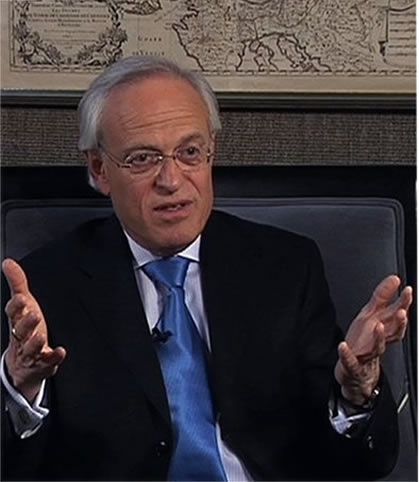 |
Ambassador (ret) Martin Indyk
... former U.S. Ambassador to Israel, Director of the Saban Center for Middle East Policy at The Brookings Institution. Ambassador Indyk’s carefully documented book Innocent Abroad: An Intimate Acount of American Peace Diplomacy in the Middle East details and critiques the broad sweep of U.S. policy in the Middle East he helped develop and implement. Ambassador Indyk was born in England and educated in Australia before making the United States his home in the early 1980s. Twice the U.S. Ambassador to Israel under President Bill Clinton, he also served in that capacity for the first six months of the Bush administration, as well as in a number of other high level capacities over many years, making him one of the United States’ top diplomats. |
There is a broad consensus across the world that we have to solve the conflict between Israel and the Palestinians, says former U.S. Ambassador to Israel Martin Indyk. “(Israel’s) security cannot be achieved by force alone, as we just saw in Gaza. There needs to be a diplomatic effort to resolve the conflict and it can’t succeed without American engagement,” his says, based on first-hand experience of failures in both the Clinton and Bush eras.
“The heart of the problem here is that Palestinians and Israelis, while they believe in a two-state solution, they don’t believe it’s possible. Barack Obama’s critical challenge is to convince Israelis and Palestinians -- the people -- that it can still work, and re-instill some hope in the minds of the people that, in fact, making peace is going to secure their futures better than continuing this bloody conflict.”
Be realistic, the Ambassador says. Recognize that President Obama enters a situation much changed since 1993 when Bill Clinton entered the White House as President and Mr. Indyk was his advisor.
“The landscape’s changed for the worse in a lot of dramatic ways. The broad strategic environment in the region -- which affects the calculus of the leaders there -- is dangerous. And yet it has opportunities. People are exhausted by this conflict. They can see that it’s Al-Queda and it’s Hamas and it’s Hezbollah and it’s Ahmadinejad who are gaining from this conflict and everybody else is losing.
“So people would like to see it finished. There are 23 Arab states who have signed up to ending the conflict with Israel through the Arab League Peace Initiative. I think it’s 56 Muslim countries, including the Arab states, who are also signed on to this peace initiative.
“In the United States, what’s critical is that those who have an interest -- the Arab-American community and the American-Jewish community -- need to mobilize in support of ending this conflict instead of supporting the hardliners on both sides.
“There is a solution: an independent Palestinian state -- viable, contiguous, in the West Bank and Gaza -- living alongside a Jewish State of Israel, in peace. The problem with ‘we all know the light at the end of the tunnel’ is that we don’t have a tunnel. The problem is, how do we get there? We have to harness the intention."
Ambassador Indyk wrote his book and is speaking out because, he says, he felt a very personal responsibility for what went wrong.
“I felt obliged to try to discern the lessons from our experience as a kind of lantern on the stern. I knew a time would come when a new President would try to make peace again. They’ll make their own mistakes, but at least they can avoid the mistakes that were made by Clinton and Bush.”
The Middle East, he reminds us, has seen great powers come and go, all the way back to Alexander the Great.
“Now come the Americans, except we came with the naiveté that the others did not. We want change, we want it to come quickly and we’re very impatient. It’s not just our innocence. There’s also an arrogance -- assuming that they want to be like us -- and an ignorance of their ways and history.”
[This Program was recorded February 5, 2009, in Atlanta, Georgia, U.S.]
audio content:
Conversation 1 |
Conversation 2 |
Conversation 3 |
Conversation 4 |
Conversation 5 |
Conversation 6 |
8:54 |
12:49 |
11:03 |
7:59 |
9:26 |
|
 |
 |
 |
 |
 |


